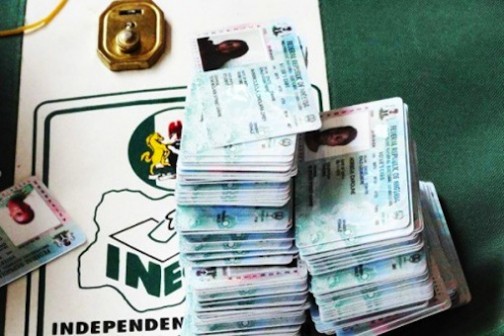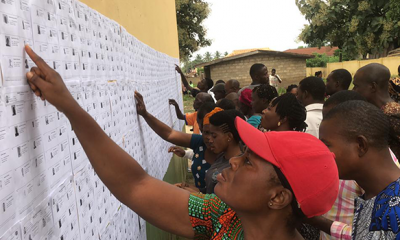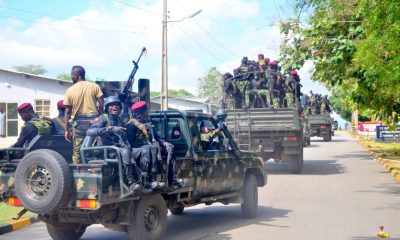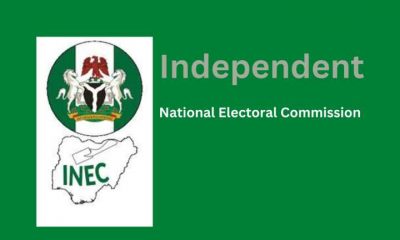Politics
INEC presents Voters register of 84m Nigerians for 2019 elections
Published
5 years agoon
By
Olu Emmanuel
- Lagos records highest figure of 6.6m, Kano 5.5m
The Independent National Electoral Commission, INEC, has revealed that over 84 million eligible Nigerians were registered to vote in the 2019 general elections. The Commission disclosed the figure at the presentation of the register of voters to Chairmen of the 91 political parties in the country.
Presenting the register at the quarterly consultative meeting with Chairmen of political parties in Abuja on Monday, INEC Chairman, Professor Mahmood Yakubu, affirmed toNigerians that there was no plan to create new polling units or voting points, aside from those used for the 2015 general elections.
“As you would have noticed, the Commission has been diligently implementing the timetable and schedule of activities for the 2019 general elections. We have so far implemented eight out of 14 activities.
“At this meeting, we shall implement the 9th activity by publishing the final register of voters for the 2019 general elections as required by law.
“In fulfilment of this legal requirement, the commission has made available to each political party a copy of the entire national register of voters.
“After the mandatory display of the register in all polling units nationwide for claims and objections from November 6-12, 2018, the final register for the 2019 General Elections stands at 84,004,084 voters,” INEC Chairman declared.
The Voters register indicates that Lagos State the highest number of registered of about 6.6 million voters, followed by Kano with 5.5 million registered voters.
The North West has the highest number of registered voters with over 20.2 million, followed by South-West with 16.3 million voters. The South-East has the least with slightly over 10 million voters; North East, 11.3 million; North Central, 13.4 million; and South-South, 12.9 million. Also male voters constitute 44.4 million, while females account for 39.6 million voters.
Yakubu noted that the Commission has printed and delivered the Permanent Voters’ Cards (PVCs) to states for collection by registered voters, urging all registered voters who have not collected their PVCs to approach any of INECs local government area office and other designated collection centres nationwide to pick up their cards.
“While we are encouraged by the response so far, millions of cards are yet to be collected. I wish to reiterate that the commission will not allow the collection of PVCs by proxy. Registered voters should endeavour to collect their cards personally without which noperson can vote on Election Day,” he declared.
The INEC Chairman also reaffirmed that the Commission still stands on the policy that Smart Card Readers will be used for the 2019 General Elections for accreditation of voters. “For clarity, I wish to stress that the function of the Smart Card Reader during accreditation is to confirm, verify and authenticate the voter.
“First, it shall be used to confirm that the PVC is genuine and issued by INEC. Cloned cards or cards that do not match the codes for a particular polling unit in which the voter is registered will be rejected by the Card Readers.
“Secondly, the Card Readers shall verify that the voter who presents the PVC is the actual owner of the Card by ensuring that the personal details on the Card Reader are consistent with the manual register for the polling unit.
“Thirdly, the Card Reader shall be used to authenticate the fingerprint of the voter as an additional confirmatory procedure. If the fingerprint is not authenticated by the Card Reader but the PVC is confirmed as genuine and the voter’s personal details are consistent with the manual register, he/she shall be allowed to vote.
“However, where the biometric authentication fails, the voter will be required to thumbprint a box next to his/her picture on the register and to enter his/her mobile telephone number before proceeding to vote.
“The Commission has modified the Register of Voters for the 2019 General Elections accordingly. Consequently, the separate Incident Form used in previous elections which is only completed by the Presiding Officer without the involvement of the voter is now abolished.
“Similarly, the claim that the Card Reader has been enhanced to recapture voters’ fingerprints at polling units and automatically overwrite the biometric record on our database is untrue and should be disregarded,” the INEC Chairman clarified.
He maintained: “As the election date is fast approaching, the Commission wishes to advise the leaders of political parties to start compiling the lists of your party agents for submission not later than 14 days to the election.
“In line with the timetable and schedule of activities for the 2019 General Elections, the deadline for Presidential and National Assembly elections is 1st February 2019 while Governorship, State Assembly and FCT Area Council elections is 16th February 2019.”
Prof Yakubu said that very soon, the Commission will schedule a Train-the-Trainer Workshop for party agents. He urged party leaders to nominate competent persons as master trainers capable of cascading the training to other party agents.
You may like


CP orders massive deployment of Police Operatives, resources for bye elections in Enugu


INEC REC in Adamawa flees to Niger Republic after announcing illegal result


INEC lists seven voting procedures in Bayelsa, Imo, Kogi governorship elections


Army demonstrate ‘Show of Force’ for peaceful election in Kogi


INEC beefs up security alert for staff


Tribunal sacks APC senator, declares Natasha Akpoti winner
Trending

 Football6 days ago
Football6 days agoGuardiola advised to take further action against De Bruyne and Haaland after both players ‘abandoned’ crucial game

 Aviation7 days ago
Aviation7 days agoDubai international airport cancels flights as flood ravages runway, UAE

 Aviation1 week ago
Aviation1 week agoNCAA suspends three private jet operators for engaging in commercial flights

 Featured4 days ago
Featured4 days agoPolice reportedly detain Yahaya Bello’s ADC, other security details

 Comments and Issues5 days ago
Comments and Issues5 days agoNigeria’s Dropping Oil Production and the Return of Subsidy

 Education5 days ago
Education5 days agoEducation Commissioner monitors ongoing 2024 JAMB UTME in Oyo

 Business5 days ago
Business5 days agoMaida, university dons hail Ibietan’s book on cyber politics

 Education7 days ago
Education7 days agoOsun NSCDC solicits cooperation towards national assets protection

